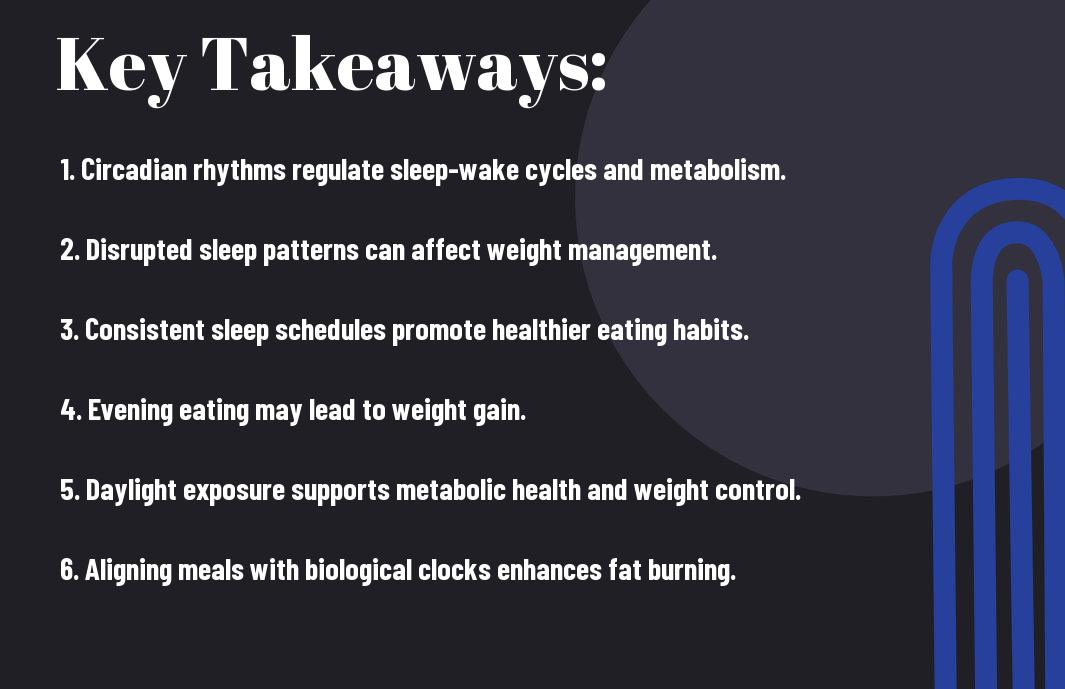Many factors influence your weight, and one often overlooked aspect is your circadian rhythm. This natural, internal process regulates the sleep-wake cycle and affects hormonal balance, metabolism, and appetite. Understanding how your body’s biological clock impacts your eating habits and energy levels can empower you to make informed decisions about your lifestyle. By aligning your daily routines with your circadian rhythm, you can optimize your weight management efforts and enhance your overall well-being. Dive into the science of circadian rhythms and discover practical strategies for better health.
Key Takeaways:
- Circadian Rhythm: It refers to the natural internal process that regulates the sleep-wake cycle and repeats roughly every 24 hours.
- Impact on Weight: Disruptions in circadian rhythm can lead to weight gain and obesity by affecting metabolism and appetite regulation.
- Sleep Quality: Poor sleep can alter hormonal balances, particularly increasing levels of ghrelin (hunger hormone) and decreasing leptin (satiety hormone).
- Feeding Timing: Eating in alignment with your body’s natural circadian rhythm can enhance metabolic health and potentially aid in weight management.
- Daylight Exposure: Natural light helps regulate circadian rhythms, promoting better sleep and potentially supporting weight-loss efforts.
- Consistency is Key: Keeping a regular sleep schedule aids in maintaining a stable circadian rhythm, which can influence overall health and weight.
- Healthy Habits: Combining a balanced diet with physical activity during daylight hours enhances the positive effects of circadian rhythms on metabolism.
What is Circadian Rhythm?
While you may not realize it, your body operates on a natural internal clock known as the circadian rhythm, which governs your sleep-wake cycles and various physiological processes throughout the day. This rhythm is influenced by external factors like light exposure and can significantly affect your health, including weight management and metabolic functions.
Definition and Importance
What you need to know is that circadian rhythm is a roughly 24-hour cycle that regulates your biological processes, including hormone release, digestion, and sleep patterns. Understanding this rhythm can help you optimize your daily habits, making it necessary for your overall well-being and weight management.
Biological Mechanisms
An necessary aspect of circadian rhythm is its influence on biological mechanisms, which include hormonal regulation, metabolism, and cellular repair. Your body’s internal clock works to synchronize these processes with the natural light-dark cycle, ensuring that you are functioning at your best during the day and resting adequately at night.
It plays a significant role in how your body utilizes energy and stores fat. For instance, disruptions in your circadian rhythm can lead to imbalances in hormones like insulin and cortisol, which influence appetite and fat storage. By aligning your daily routines with your body’s natural rhythms, you can improve not just your physical health but also your capacity to maintain a healthy weight.


The Relationship Between Circadian Rhythm and Weight
If you’re struggling with weight management, examining your circadian rhythm may be beneficial. Research shows that your body’s internal clock influences not only your sleeping patterns but also your metabolic processes. This means that the timing of your meals can play a significant role in weight regulation. For a deeper understanding, check out this article on Circadian Rhythm and Weight Loss.
How Circadian Rhythm Affects Metabolism
On a 24-hour cycle, your metabolism naturally fluctuates, largely influenced by the time of day. Hormonal changes related to sleep-wake cycles dictate when your body is primed for digestion and energy expenditure. By aligning your eating patterns with these natural rhythms, you can optimize metabolic function and promote healthier weight management.
Impact on Eating Habits and Food Choices
Metabolism is also affected by when you eat, not just what you eat. Your body’s preference for energy intake is higher during specific hours of the day. Eating in sync with your circadian rhythm can enhance the way your body processes food and utilizes energy, potentially influencing your weight outcomes.
In fact, studies indicate that you may experience better satiety and metabolic efficiency when your meals align with your natural circadian rhythm. Eating late at night can lead to increased fat storage and impaired metabolism, while consistent meal timing throughout the day supports healthier food choices and appetite regulation. Embracing this approach may help you establish a more balanced relationship with food and improve your overall health.

Disruptions in Circadian Rhythm
Despite the importance of maintaining your circadian rhythm, various factors can lead to its disruption. This misalignment can negatively affect your metabolism and fat cell function, as highlighted in research about Circadian Clocks Play a Key Role in Fat Cell Growth. Issues such as inconsistent sleep patterns, irregular meal timings, and exposure to artificial light at night can further exacerbate these disruptions, impacting overall health and weight management.
Causes of Disruption
At times, your lifestyle choices can contribute heavily to disrupting your circadian rhythm. Shift work, late-night screen exposure, and irregular eating habits may throw off your internal clock, leading to an imbalance in hormone levels that regulate hunger and energy expenditure.
Consequences for Weight Management
Disruptions in your circadian rhythm can significantly affect your weight management strategies. Your body relies on regular cycles for processes such as metabolism, making it more challenging for you to lose or maintain weight when these cycles are out of sync.
Due to these disruptions, you may experience increased cravings, irregular appetite, and altered insulin sensitivity—all of which can hinder your efforts to control your weight. Furthermore, your body’s ability to store fat and burn calories efficiently can become compromised, making it important to prioritize maintaining a stable circadian rhythm for better weight management.
Strategies for Aligning Circadian Rhythm
Many individuals find it beneficial to implement strategies that align their lifestyles with their natural circadian rhythms. Establishing routines that prioritize consistent sleep patterns, appropriate meal timings, and exposure to natural light can enhance your body’s internal clock. By aligning your daily activities with your biological processes, you may improve overall well-being, energy levels, and even weight management.
Sleep Hygiene Practices
For optimal sleep, you should prioritize sleep hygiene practices that foster a restful environment. This includes maintaining a cool, dark, and quiet bedroom, establishing a consistent sleep schedule, and limiting screen time before bed. These habits help signal to your body when it’s time to wind down and prepare for restorative sleep.
Meal Timing and Composition
An effective strategy for aligning your circadian rhythm is to pay attention to meal timing and composition. Consuming meals at regular intervals throughout the day, particularly aligning them with daylight hours, can support your metabolic processes. Avoid late-night eating, as it may disrupt your sleep quality and hinder weight management efforts.
Consequently, focusing on meal composition by incorporating whole foods rich in nutrients, balanced macronutrients, and limiting processed foods can also significantly impact your circadian rhythm and overall health. Aim to have your largest meals earlier in the day when your metabolism is naturally more active. This adjustment can improve digestion and energy levels, allowing your body to better synchronize with its natural rhythms, ultimately supporting your weight management goals.
Research and Findings
Once again, scientific studies have illustrated the intricate relationship between circadian rhythms and weight management. Research indicates that misaligned sleep-wake cycles can disrupt metabolic processes, leading to weight gain. Findings suggest that those who adhere to consistent sleep patterns may find it easier to maintain a healthy weight. Biorhythms not only influence when you eat but also how your body processes food, linking proper circadian alignment with optimal weight management.
Recent Studies on Circadian Rhythm and Weight
An increasing number of studies have focused on how circadian rhythms affect weight regulation. Research has documented that irregular sleep schedules can lead to increased appetite and cravings for unhealthy foods. Furthermore, these studies suggest that aligning your eating habits with your body’s natural clock may improve metabolic health and support weight loss efforts. As you understand these findings, you can make informed decisions about your daily habits.
Implications for Weight Loss Programs
Weight loss programs can greatly benefit from incorporating principles of circadian rhythm into their guidelines. By aligning your eating patterns with your natural biorhythms, you may enhance your body’s ability to burn fat and build muscle. Programs that promote regular meal timing and consistent sleep can make it easier for you to achieve and sustain weight loss.
Implications of integrating circadian rhythm insights into weight loss strategies are significant. By focusing on meal timing, you can optimize your metabolism in sync with your body’s natural cycles. For instance, having your largest meal earlier in the day when your metabolism is most active can aid in weight management. Additionally, prioritizing quality sleep can enhance recovery and regulate hormones that influence hunger. By understanding and applying these principles, you can make more effective changes to your weight loss journey.

Practical Applications
Your daily habits significantly impact your circadian rhythm and weight management. By understanding these rhythms, you can make specific choices that support your health goals. Prioritize going to bed and waking up at the same time each day to enhance your sleep quality, and incorporate light exposure in the morning to help set your body’s internal clock. Implementing these habits can lead to better energy levels and improved weight management.
Tips for Incorporating Circadian Awareness
Between managing your sleep schedule and meal timing, consider these actionable tips:
- Establish a consistent sleep schedule, aiming for 7-9 hours of sleep.
- Limit screen time before bed to promote better sleep quality.
- Schedule meals to align with daylight hours for optimum metabolism.
- Engage in regular physical activity during daylight for better hormonal balance.
- Create a bedtime routine that signals your body it’s time to wind down.
The integration of these tips can significantly enhance your circadian awareness and support your overall well-being.
Lifestyle Modifications for Better Health
About adjusting your lifestyle to sync with your circadian rhythm can lead to profound health benefits. Prioritize nutrition by consuming more whole foods while minimizing sugar and processed foods, especially in the evening. Incorporate regular exercise into your routine, ideally during the day, to support natural energy levels and sleep quality. Reducing caffeine intake in the afternoon will also promote better sleep at night.
To achieve these lifestyle modifications, focus on consistency and gradual changes to your routine. Start by assessing your current habits and identify areas for improvement, such as meal timing and physical activity levels. For example, if you usually have dinner late, start shifting it to an earlier time. Consistent exercise, even in small increments, can significantly benefit your circadian alignment and improve your overall health profile. Engaging with these modifications not only enhances your circadian rhythm but also supports sustainable weight management.
Final Words
From above, it’s clear that understanding your circadian rhythm can significantly impact your weight management efforts. By aligning your eating and sleeping patterns with your natural biological clock, you can enhance the effectiveness of your diet and exercise routines. Prioritizing consistent sleep and mindful meal timing may help regulate your metabolism, support better energy levels, and ultimately contribute to your weight goals. By being mindful of these rhythms, you empower yourself to make more informed decisions regarding your health and lifestyle.
FAQ
Q: What is circadian rhythm?
A: Circadian rhythm refers to the physical, mental, and behavioral changes that follow a 24-hour cycle. It is influenced by external cues like light and darkness and is responsible for sleep-wake cycles, hormone release, and other bodily functions.
Q: How does circadian rhythm affect weight management?
A: Circadian rhythm influences various metabolic processes, including appetite regulation, fat storage, and energy expenditure. Disruptions to this rhythm can lead to imbalances in these processes, potentially resulting in weight gain or difficulties in maintaining a healthy weight.
Q: Can irregular sleep patterns impact my weight?
A: Yes, irregular sleep patterns can significantly impact weight. Poor sleep quality and inconsistent sleep schedules can affect hormone levels, leading to increased hunger and cravings, often resulting in weight gain over time.
Q: What role do hormones play in circadian rhythm and weight?
A: Hormones such as melatonin, cortisol, insulin, and ghrelin are closely linked to circadian rhythms. Disruptions in circadian patterns can alter these hormone levels, affecting appetite, metabolism, and fat storage, which can ultimately influence weight.
Q: How can I align my eating habits with my circadian rhythm?
A: To align eating habits with your circadian rhythm, try to eat at consistent times each day, ideally when your body is naturally inclined to feel hungry. Consuming most of your calories earlier in the day may be beneficial, as your metabolism tends to be more active during daylight hours.
Q: Does exposure to natural light have an effect on circadian rhythm and weight?
A: Yes, exposure to natural light plays a fundamental role in regulating circadian rhythms. Adequate sunlight during the day can help influence sleep quality and overall energy balance, making it easier to maintain a healthy weight.
Q: What lifestyle changes can support a healthy circadian rhythm?
A: Lifestyle changes that support a healthy circadian rhythm include establishing a consistent sleep schedule, creating a relaxing bedtime routine, minimizing screen time before bed, getting regular physical activity, and seeking natural light exposure during the day.





